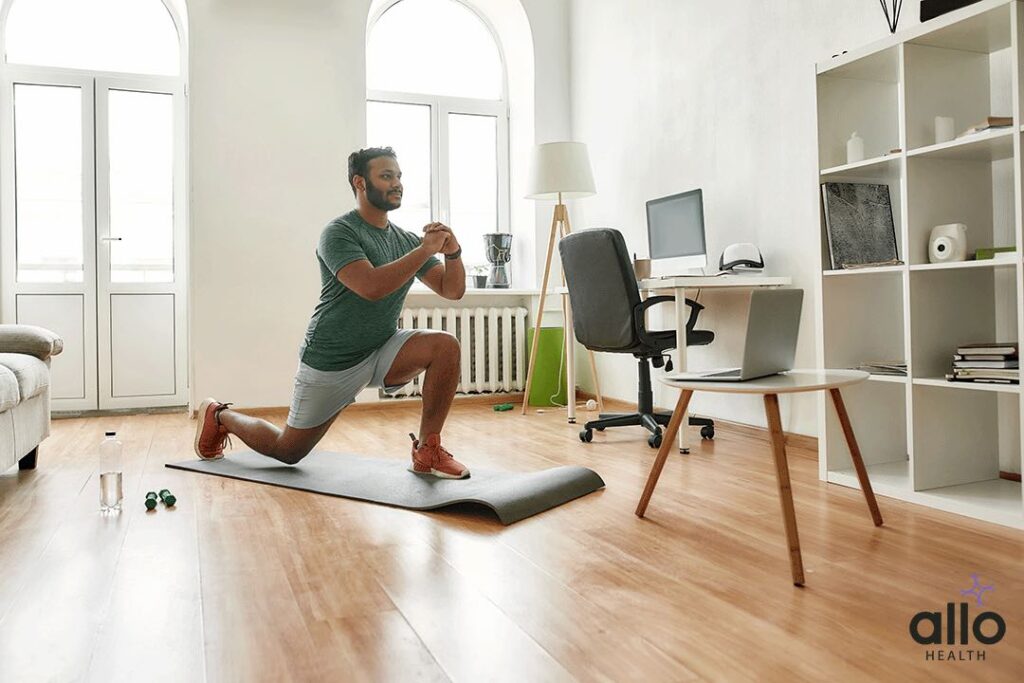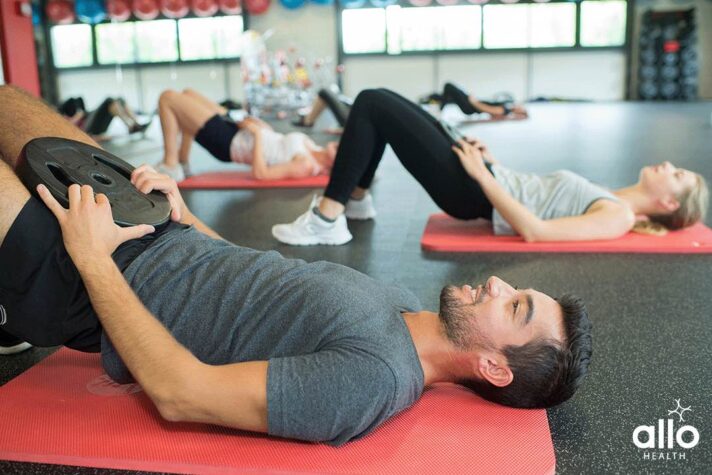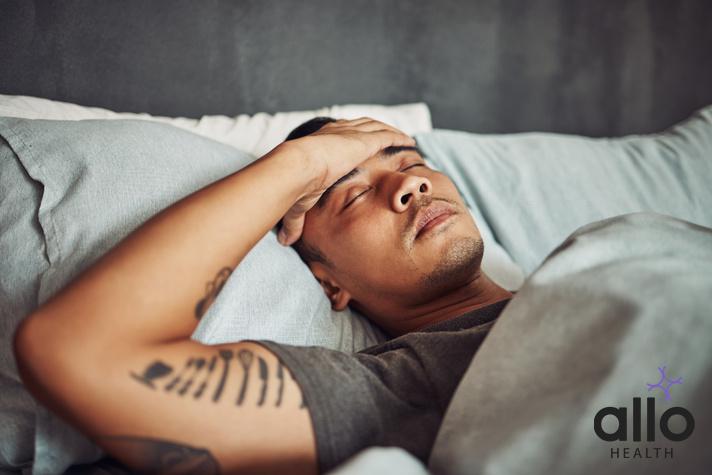9 Exercises to Increase Libido: Boost Your Sexual Health Naturally

Allo Health is dedicated to personalized well-being, offering support and trusted information tailored to individual health goals. The platform emphasizes human-generated content, led by a distinguished medical team of experts, including physicians and sexual health specialists. Their commitment to credibility involves rigorous fact-checking, authoritative research, and continuous updates to ensure accurate, up-to-date information. Allo Health's unique approach goes beyond conventional platforms, providing expert-led insights and a continuous commitment to excellence, with user feedback playing a crucial role in shaping the platform's authoritative voice.

Dr Sanina Mansoor holds MBBS degree from Yenepoya university,Mangalore.She has 8 years of experience working as a medical officer at various health centres and medical colleges.
Why This Was Upated?
Our experts continually monitor the health and wellness space, and we update our articles when new information became available.
Updated on 10 February, 2024
- Article was updated as part of our commitment to diversity, equity, and inclusion.

"The following blog article discusses exercise and its potential benefits for general health and well-being. However, it is important to understand that the information provided is for general educational purposes only and should not be considered as personalized exercise advice or a substitute for professional guidance from a qualified fitness professional or healthcare provider. Before starting or modifying any exercise program, it is recommended to consult with a qualified fitness professional.
Book consultation
The information presented in this article may not be suitable for everyone, as individual fitness levels, health conditions, and limitations can vary significantly. A qualified fitness professional can assess your specific fitness needs, consider any medical concerns or limitations, and provide personalized recommendations and exercise plans that are safe and effective for you.
Participating in physical activity, including exercise, carries inherent risks. It is crucial to listen to your body, exercise within your personal limits, and be aware of any signs of discomfort or potential injury. If you experience any pain, dizziness, shortness of breath, or other concerning symptoms during exercise, it is important to stop immediately and seek medical attention if necessary.
The exercises or activities mentioned in this article may not be suitable for individuals with specific medical conditions, injuries, or physical limitations."
A fulfilling sex life is an essential aspect of life for many individuals. However, various factors can impact one’s sex drive and sexual function, including stress, hormonal imbalances, and physical health. Fortunately, incorporating regular exercise into your routine can significantly improve your sexual health and overall well-being. In this article, we will explore various exercises to increase libido and enhancing your sex life.
What is Libido and It’s Complications?
Libido refers to an individual’s sexual desire or sex drive. It’s the innate, psychological, and emotional component that fuels one’s interest in sexual activity. A healthy libido is integral to a fulfilling sex life and overall well-being.
Complications due to low libido can be significant:
- Relationship Strain: Low libido can strain relationships, causing frustration and emotional distance between partners.
- Stress and Anxiety: It often leads to stress and anxiety, creating a vicious cycle that further diminishes sexual desire.
- Self-Esteem Concerns: Low libido can erode self-esteem, impacting confidence in intimate situations.
- Depression: It may contribute to or worsen symptoms of depression, affecting mental health.
- Decreased Quality of Life: Reduced sexual desire can result in a decreased quality of life and overall dissatisfaction.
- Impact on Partners: Partners may feel unattractive or undesired, impacting their self-esteem and happiness.
- Marital Problems: Persistent low libido can lead to marital conflicts and even separation.
- Reproductive Concerns: In some cases, it can hinder attempts to conceive and start a family.
- Underlying Health Problems: Low libido can be a symptom of underlying health concerns such as hormonal imbalances or medical conditions.
Addressing low libido is essential for both personal and relational well-being. Seeking professional advice and exploring lifestyle changes, such as exercise and stress management, can help improve libido and its associated complications.
Benefits of Exercises in Sexual Health
Exercise plays a pivotal role in enhancing sexual health and offers a multitude of benefits that positively impact various aspects of one’s sex life:
- Improve Blood Flow: Cardiovascular exercises, such as running or swimming, promote healthy blood circulation. This increased blood flow benefits sexual arousal and erectile function, reducing the risk of erectile dysfunction.
- Maintain Hormonal Balance: Regular physical activity helps maintain balanced sex hormone levels, notably testosterone. This hormonal equilibrium contributes to a healthier sex drive and overall sexual function.
- Helps in Stress Reduction: Exercise is an excellent stress-reliever. Lowering anxiety levels can lead to increased desire for sex and better sexual performance. Reduced anxiety also aids in combating symptoms of erectile dysfunction.
- Weight Management: Engaging in aerobic activities and weight training helps manage body weight, reducing the risk of obesity-related sexual dysfunction and boosting self-confidence.
- Strengthen Pelvic Floor: Specific exercises, such as kegel exercise and pelvic floor exercises, strengthen pelvic muscles, which are crucial for sexual endurance and function. This is especially beneficial for women.
- Build Core Strength: Strong core muscles improve body control and engagement during sexual activity, leading to a more satisfying experience.
- Enhance Confidence: Regular exercise routines contribute to toned bodies and better self-esteem, positively influencing sexual desire and drive.
- Maintain Cardiovascular Health: Maintaining good cardiovascular health is essential for proper blood pressure and blood vessel health, critical for sexual function.
- Weight Loss: Physical activity is a key component of weight loss plans. Shedding excess pounds can improve sexual health by enhancing libido and reducing the risk of co-occurring conditions affecting sexual function.
Incorporating regular exercise into your lifestyle offers a myriad of benefits for sexual health, from boosting blood flow and hormonal balance to reducing stress and improving confidence. It is a natural and effective way to enhance your sex life and overall well-being.
Can Exercising Increase Libido?
Yes, exercising can indeed increase libido and improve sexual dysfunction. Here’s how it works:
- Enhance Blood Flow: Engaging in cardiovascular exercises, such as running or swimming, boosts blood circulation throughout the body, including the genital area. Improved blood flow aids in sexual arousal and erectile function, reducing the risk of erectile dysfunction, especially in men.
- Hormone Regulation: Regular exercise helps balance sex hormones, such as testosterone. This hormonal equilibrium contributes to a higher sex drive and enhanced sexual function, benefiting both men and women.
- Weight Management: Obesity and excess body weight can lead to a decrease in sexual desire and performance. Exercise, particularly aerobic activities, assists in weight loss, promoting a healthy body weight, and subsequently increasing the desire for sex.
- Strengthen Pelvic Floor Muscles: Kegel exercises strengthen pelvic floor muscles, essential for maintaining sexual endurance and function. For men with erectile dysfunction, these exercises can be particularly beneficial.
- Reduce Anxiety: Moderate exercise routines reduce anxiety levels, which can negatively impact sexual desire and performance. Lower anxiety levels result in increased sexual arousal and overall sexual satisfaction.
Incorporating exercise, such as cardiovascular workouts, strength training, and pelvic floor exercises, into your regular routine can positively impact your sex life. It promotes better blood flow, hormone regulation, weight management, and reduced anxiety levels, all contributing to an increase in libido and an improved overall sexual experience.
Note: While physical activity can indirectly improve overall well-being and potentially have a positive impact on sexual health, it should not be solely relied upon as a guaranteed solution for enhancing libido. Other factors, such as hormonal balance, emotional well-being and medical treatment should also be considered when addressing concerns related to libido. Always consult with a healthcare provider for personalized advice and solutions tailored to your specific needs and concerns.
Best Exercises for Erectile Dysfunction Treatment

- Kegel Exercises for Pelvic Floor Muscles:
- Kegel exercises, beneficial for both men and women, strengthen pelvic floor muscles, promoting better sexual function and control.
- Improved pelvic muscles can enhance sexual endurance, reducing the risk of sexual dysfunction.
- Cardiovascular Exercise for Blood Flow:
- Engaging in regular cardio exercises like running, swimming, or cycling can significantly enhance blood flow, including to the genital area.
- This improved blood flow can lead to increased sexual arousal, better erectile function, and improved overall cardiovascular health.
- Strength Training for Testosterone Levels:
- Incorporating strength training routines, such as weightlifting, can boost testosterone levels, vital for a healthy sex drive.
- Regular strength training can also help individuals achieve toned bodies, increasing confidence and sexual desire.
- Yoga Poses for Body Control:
- Yoga offers beginner-friendly poses that improve body control, engagement, and flexibility.
- Certain yoga poses can reduce anxiety levels, ultimately enhancing sexual desire and enjoyment.
- Aerobic Activities for Weight Loss:
- Maintaining a healthy body weight is crucial for a robust sex drive and overall sexual health.
- Engaging in aerobic activities, such as brisk walking or dancing, aids in weight loss and boosts sexual desire.
- Pelvic Floor Exercises for Erectile Dysfunction:
- Men experiencing erectile dysfunction can benefit from pelvic floor exercises, which strengthen pelvic muscles and support adequate erectile function.
- Core Exercises for Body Strength:
- Core exercises, like planks and sit-ups, improve overall body strength, control, and engagement during sexual activity.
- Moderate Exercise for Reduced Anxiety Levels:
- Incorporating moderate exercise routines into your daily life can lower anxiety levels, positively impacting sexual arousal and desire.
- Exercise as an Activity for Weight Loss:
- Obesity and being overweight can reduce sexual desire and pose adverse health risks.
- Regular exercise is a fundamental component of any weight loss plan, improving both sexual health and overall well-being.
By incorporating these exercises into your regular routine, you can improve your libido, enhance sexual function, and enjoy the many health benefits of an active lifestyle, positively impacting various aspects of your life. However, it’s essential to consider any underlying conditions and consult a healthcare professional before starting a new exercise regimen.
Note: While regular exercise has numerous health benefits, it’s essential to understand that it is not a definite solution for increasing libido. Scientific research regarding the direct relationship between exercise and libido is limited and inconclusive.
Risks and Considerations

Exercising to boost libido and improve sexual health can be beneficial, but it’s essential to be aware of potential risks and considerations:
- Overtraining and Hormonal Imbalance: Excessive exercise, especially intense strength training, can lead to hormonal imbalances, affecting sex hormone levels. This may decrease sex drive.
- Injury and Physical Strain: Engaging in vigorous exercises without proper form or warm-up can result in injuries, including muscle strains and pelvic floor concerns.
- Mental Stress and Anxiety: Intense exercise routines can increase anxiety levels, negatively impacting sexual desire and performance.
- Co-Occurring Health Conditions: Individuals with underlying medical conditions, such as cardiovascular concerns or diabetes, should consider exercise’s impact on these conditions, as they can affect libido.
- Balance Exercise with Rest: Overexertion without adequate rest can lead to fatigue, reducing the desire for sexual activity.
- Dip in Sex Drive: Some individuals may experience a temporary decrease in sex drive due to increased physical activity, which could be a result of fatigue or hormonal changes.
- Consult a Healthcare Professional: Before starting a new exercise regimen, especially for those with pre-existing conditions, it’s crucial to consult a healthcare professional to ensure exercise aligns with their overall health and any medications they may be taking.
- Individual Variations: Exercise affects individuals differently, so it’s essential to pay attention to your body’s response. What works for one person may not yield the same results for another.
- Balance Cardio and Strength Training: Balancing cardiovascular exercises with strength training is essential to avoid hormonal imbalances while reaping the benefits of both.
- Listen to Your Body: Pay attention to signs of exhaustion, stress, or discomfort during exercise. Modify your routine if necessary to prevent adverse health risks and prioritize overall well-being.
While exercise has a significant role in enhancing libido and sexual health, it’s essential to strike a balance, avoid overtraining, and consider individual factors and underlying health conditions. Consulting a healthcare professional and maintaining a mindful approach to exercise can help maximize its benefits while minimizing potential risks.
Other Treatment Options
Treatment options for libido, when considered alongside exercises and other lifestyle modifications, can help address sexual health concerns effectively. Here are some options to boost libido and overall sexual well-being:
- Hormone Therapy: In cases of imbalanced sex hormones, hormone therapy may be prescribed to restore optimal testosterone levels, improving sex drive and function.
- Psychological Counseling: Addressing anxiety levels and underlying psychological factors through counseling can enhance sexual desire and reduce symptoms of erectile dysfunction.
- Medications: Erectile dysfunction medications such as viagra can assist in achieving and maintaining erections, complementing exercise routines for improved sexual function.
- Lifestyle Changes: A combination of regular exercise, balanced diet, and weight management can have a significant impact on libido, blood flow, and overall sexual health.
- Stress Reduction Techniques: Incorporating stress-reduction techniques like meditation and mindfulness alongside exercise routines can alleviate stress-related declines in sexual arousal.
- Nutritional Supplements: Supplements like l-arginine and ginseng may help enhance sexual desire and endurance when used in conjunction with exercise.
- Communication and Relationship Counseling: Couples experiencing sexual dysfunction can benefit from counseling to address relationship concerns and communication barriers, which may impact sexual desire.
By combining exercises with these treatment options and considering individual needs and underlying conditions, individuals can work toward achieving a healthier libido and a more satisfying sex life.
Conclusion
Incorporating exercise into your regular routine can have a profound impact on your sexual health and overall well-being. Whether you’re looking to increase libido, improve sexual function, or simply enjoy the health benefits of exercise, there are numerous exercise options to explore. Remember that a healthy lifestyle, including regular exercise and a balanced diet, can positively influence various aspects of your life, including your sex life.
Most Asked Questions
-
How can exercise help improve my sex life?
Exercise can enhance blood flow, strengthen pelvic muscles, and balance sex hormones, all of which contribute to a better sex drive and improved sexual function.
-
What type of exercises are best for boosting libido?
Cardio exercises, strength training, yoga poses, and pelvic floor exercises can all play a role in increasing your sex drive and overall sexual health.
-
Can exercise help with conditions like erectile dysfunction or low sexual desire?
Yes, exercise can benefit individuals with conditions like erectile dysfunction by improving blood flow and pelvic muscle strength. It can also increase sexual desire by regulating sex hormone levels.
-
How often should I exercise to see improvements in my sex life?
Consistency is key. Aim for a regular exercise routine, at least a few times a week, to experience the health benefits and positive impact on your sexual health.






































